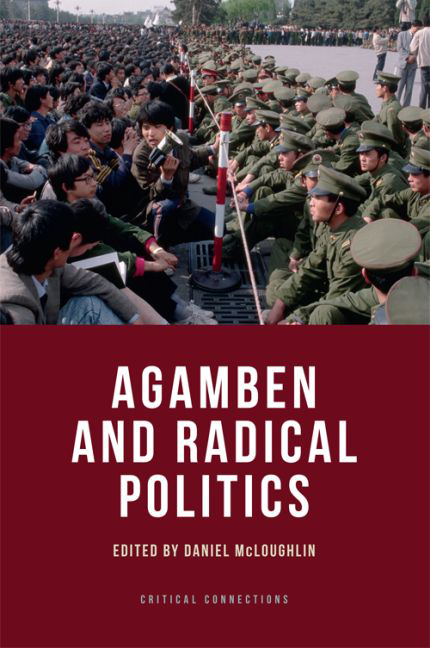Book contents
- Frontmatter
- Contents
- Acknowledgements
- Introduction: Agamben and Radical Politics
- 1 Capitalism as Religion
- 2 Glory, Spectacle and Inoperativity: Agamben's Praxis of Theoria
- 3 On Property and the Philosophy of Poverty: Agamben and Anarchism
- 4 ‘Man Produces Universally’: Praxis and Production in Agamben and Marx
- 5 Liturgical Labour: Agamben on the Post-Fordist Spectacle
- 6 An Alogical Space of Genetic Reintrication: Notes on an Element of Giorgio Agamben's Method
- 7 Zoē aiōniōs: Giorgio Agamben and the Critique of Katechontic Time
- 8 Agamben, Badiou and Affirmative Biopolitics
- 9 Form-of-Life and Antagonism: On Homo Sacer and Operaismo
- 10 What Is a Form-of-Life?: Giorgio Agamben and the Practice of Poverty
- 11 Law and Life beyond Incorporation: Agamben, Highest Poverty and the Papal Legal Revolution
- Notes on Contributors
- Index
Introduction: Agamben and Radical Politics
Published online by Cambridge University Press: 23 September 2017
- Frontmatter
- Contents
- Acknowledgements
- Introduction: Agamben and Radical Politics
- 1 Capitalism as Religion
- 2 Glory, Spectacle and Inoperativity: Agamben's Praxis of Theoria
- 3 On Property and the Philosophy of Poverty: Agamben and Anarchism
- 4 ‘Man Produces Universally’: Praxis and Production in Agamben and Marx
- 5 Liturgical Labour: Agamben on the Post-Fordist Spectacle
- 6 An Alogical Space of Genetic Reintrication: Notes on an Element of Giorgio Agamben's Method
- 7 Zoē aiōniōs: Giorgio Agamben and the Critique of Katechontic Time
- 8 Agamben, Badiou and Affirmative Biopolitics
- 9 Form-of-Life and Antagonism: On Homo Sacer and Operaismo
- 10 What Is a Form-of-Life?: Giorgio Agamben and the Practice of Poverty
- 11 Law and Life beyond Incorporation: Agamben, Highest Poverty and the Papal Legal Revolution
- Notes on Contributors
- Index
Summary
In an essay entitled ‘In this Exile’, Giorgio Agamben tells a story about his studies with Martin Heidegger, whose seminars he attended in Provence in 1966 and 1968. At some stage, Agamben asked his teacher whether he had read any Kafka, to which Heidegger replied that ‘The Burrow’ was the tale that had made the biggest impression upon him. ‘The Burrow’ is a short story about a creature that devotes their life to constructing an elaborate and impenetrable underground home. And yet despite, or perhaps because of, this zealous attention to security, the creature is haunted by the fantasy that someone could ‘make his way in and utterly destroy everything … even now when I am better off than ever before I can scarcely pass an hour in complete tranquillity’. As the story develops, the burrow reveals itself ‘to be a trap with no way out’ – and this is, Agamben suggests, an allegory for the politics of our time:
Isn't this what has happened in the political space of Western nationstates? The homes – the ‘fatherlands’ – that these states endeavoured to build revealed themselves in the end to be only lethal traps for the very “peoples” that were supposed to inhabit them.
This kind of scathing critique of the contemporary state has played a crucial role in Agamben's influence in critical political thought over the past decade. The Homo Sacer project exploded into the consciousness of the English-speaking academy following the September 11 2001 attacks on the World Trade Center, as its analysis of the sovereign power to suspend the law, and the claim that the state of emergency had ‘become the rule’, seemed ready made to understand the security politics of the new millennium. Agamben's oft-noted ‘apocalyptic tone’ also seemed to suit the tenor of the times, given a media environment dominated by the spectacular violence of 9/11, the invasions of Iran and Afghanistan, ‘shock and awe’ tactics, and the Abu Ghraib scandal. More than a decade has passed since the moment that the sovereign exception became a central theoretical problem, and yet political events continue to confirm the relevance of Agamben's warnings about the state of emergency: many of the ‘security’ measures put in place as part of the War on Terror remain in place or have been extended;…
- Type
- Chapter
- Information
- Agamben and Radical Politics , pp. 1 - 14Publisher: Edinburgh University PressPrint publication year: 2016



